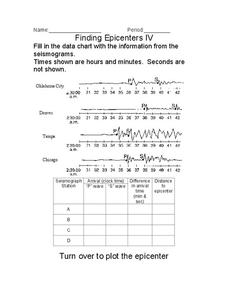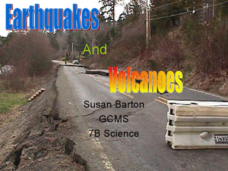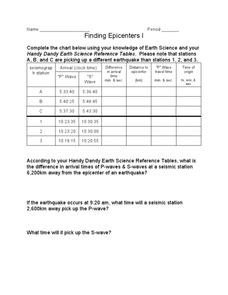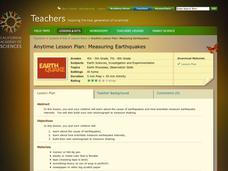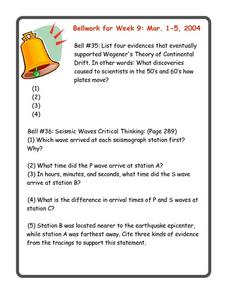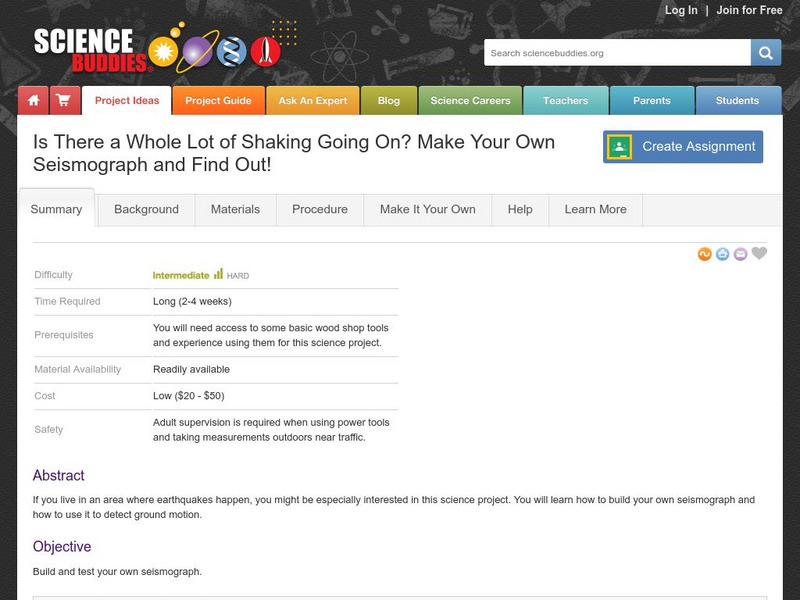Institute of Electrical and Electronics Engineers
Shake it up with Seismographs!
Shake things up in your STEM or earth science classroom when you have small groups construct their own seismographs. A reading assignment on the history of seismographs, the Richter scale, and current technology sets the stage for the...
Curated OER
Earthquake Detector
Students investigate earthquakes and describe the interactions inside the Earth that cause them to occur. Then they research the equipment and systems for detection and measurement of earthquakes. Students also build and engage in a...
Curated OER
Finding Epicenters
In this earthquake worksheet, students use the seismographs from different locations to determine the epicenter for the earthquake. Students plot the epicenter on a map. This worksheet has 1 graphic organizer.
Curated OER
Earthquakes and Volcanoes
Nice pictures, maps and informative diagrams are incorporated into this PowerPoint about earthquake types and the types of waves carrying energy produced. There are a number of pages explaining scientific terminology and diagrams to...
Curated OER
What are Earthquakes?
Here is a scientific presentation of earthquakes. The elastic rebound theory is explained, as well as the different types of waves and how they are measured. Just a note: Slide number 15 has a diagram that is upside down. Enable editing...
Curated OER
Earthquakes and Seismic Waves
Learners explore earthquakes and seismic waves. They investigate how energy is released in the subsurface to create seismic waves. Students explore the inner workings of a seismograph and how they are used to determine the location of an...
Curated OER
Epicenters
In this earthquake worksheet, students use seismographs to determine how far away the cities were from the epicenter of an earthquake. This worksheet has 1 graphic organizer.
Curated OER
Finding Epicenters 1
In this finding epicenters worksheet, learners complete a table given the "P" and "S" wave arrival times of 6 different earthquakes. Students calculate the difference in arrival time of the waves, the distance to the epicenter, the "P"...
Curated OER
Earthquake Power
In this earthquakes worksheet, students learn about the measurements of earthquakes on the Richter scale. They answer six questions about the magnitudes and sizes of earthquakes using two tables of data about earthquakes and the Richter...
Curated OER
Build a Seismograph
For this seismograph worksheet, students build a device to record the motion of a simulated earthquake. They give details of their structure and explain how it works. They present their device to the class and answer questions about...
Curated OER
Earthquakes Study Guide
For this earthquakes worksheet, students answer questions about the components of earthquakes, the causes of earthquakes, how they are measured, the types of seismic waves and the types of faults. They also answer questions about the...
Curated OER
Determining the Time of an Earthquake
In this earthquake worksheet, students will study a table showing the travel times of seismic waves from an earthquake. Students will use this information to determine when and where the earthquake occurred. This worksheet has 6 short...
Curated OER
Earthquakes Rock!
Students study the main methods to measure earthquakes; the Richter Scale and Mercalli Scale. They make a model of a seismograph and investigate which structural designs are most likely to survive an earthquake.
California Academy of Science
Measuring Earthquakes
After a brief discussion on earthquakes, make a makeshift seismograph to record the shaking of the table that it sits upon. While the background information will be useful to you as a teacher, the seismograph does not seem like it would...
Curated OER
Determining Epicenter Distance
In this earthquake worksheet, students determine the distance of the epicenter based on the S-waves and P-waves on a seismograph. This worksheet has 4 problems to solve.
Curated OER
Finding Epicenters
In this earthquake instructional activity, students determine the distance of different cities to the epicenter of an earthquake based on the "P" and "S" wave arrivals on the seismographs. This instructional activity has 1 graphic...
Curated OER
Bellwork for Week 9-Earthquakes and Continental Drift
In this earthquake and continental drift worksheet, students answer five questions about continental drift, seismic waves and earthquake safety.
Curated OER
Destruction by Earthquakes
In this earthquakes worksheet, students will name the parts of a seismograph and then review information about large magnitude earthquakes that have occurred. This worksheet has 4 fill in the blank and 7 short answer questions.
Curated OER
Locate-a-quake
Student, use seismic readings of the same earthquake from three recording stations and locate the epicenter of an earthquake on a map.
Curated OER
Destruction by Earthquakes
In this earthquakes learning exercise, students review terms associated with earthquakes such as Richter scale, seismographs, and the Moho scale. This learning exercise has 10 fill in the blank questions.
Curated OER
Earthquakes and Seismic Waves
Students investigate the Richter scale and seismology in a teacher-led lab in which they are introduced to the concept of seismic waves and epicenter location. They further investigate the inner workings of a seismograph and practice...
Curated OER
Volcanoes
Fifth graders study volcanoes. They watch a demonstration that represents the eruption of a volcano and discuss the similarities and differences between the model and a real volcano.
Science Buddies
Science Buddies: What's All That Shaking? Make Your Own Seismograph!
If you live in an area where earthquakes happen, you might be especially interested in this science project. You'll learn how to build your own seismograph and how to use it to detect ground motion.
eSchool Today
E School Today: Your Cool Facts and Tips on Earthquakes
Explains what earthquakes are, what causes them, the different types, tsunamis that can be caused by them, and how to prepare if living in an earthquake-prone area.




